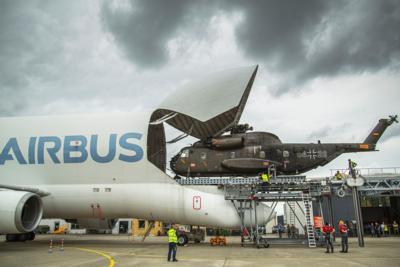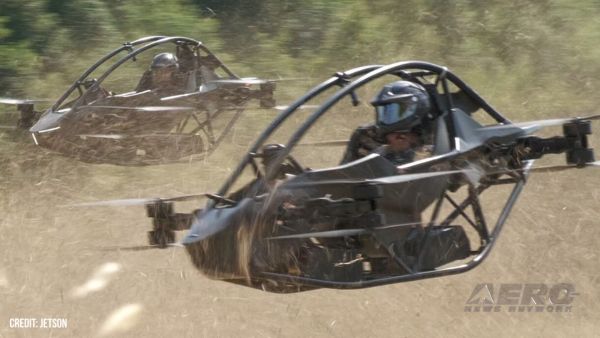Sun, Sep 25, 2022
After 1.5 Years of Design, Testing, & Development, BelugaST Fleet Sees Improved Loading Equipment
Airbus Defence and Space has successfully tested a new and improved loading system for its Beluga A300-600St aircraft, testing it out on a German CH53.

Outsized cargo is the raison d'être of the Beluga series, with an expanding customer base for the unique fleet as air cargo demand rises around the world. The new loading system aims to simplify and streamline the process of cargo transfer to the inconveniently located door aboard the aircraft. With the cargo compartment situated above the cockpit, cargo loading could quickly become a precarious, time consuming affair, a far cry from the simplicity of high-wing aircraft with a drive-up ramp. The new system aims to provide a quicker, cleaner, and safer method to load the picky aircraft, with teams at Airbus Defence working with customers around the world to develop a clean-sheet approach to process.
The end result is a mobile cargo loading system that requires no crane use, with a loading capacity of 35 tonnes. The test saw a German CH53, intact sans rotor blades, secured aboard the Beluga within an hour and a half total, only 1 hour of which was spent loading the helicopter directly. The new design isn’t a static emplacement, either, allowing the Beluga fleet to utilize the jigs and loading system in a variety of locations wherever they’re needed. While a minor benefit to some objects, the enhanced mobility adds security to some of the most valuable assets flown aboard the Beluga fleet, like irreplaceable art or one-of-a-kind historical objects. A mobile loading system should mean that far-flung cargo won’t be required to undergo as much ground travel to reach a suitably equipped airport, minimizing exposure to risk. The new equipment is good news for prospective customers of the BelugaST fleet, who have been freed up for charter with the advent of their successor, the
BelugaXL. Airbus has not yet announced plans to open the XL to private work yet, instead putting the A330-200 variant to work transporting materials between Airbus manufacturing sites.
“The demand for outsized air cargo capability is on the rise. Capacity is scarce and, in light of current geopolitical developments, many customers are looking for new, fast and efficient solutions. This is exactly what we offer with our BelugaST fleet,” said Michael Schoellhorn, CEO of Airbus Defence and Space. “Our teams have been working on a remarkable solution to facilitate a speedy, efficient and autonomous handling to load heavy military cargo onto the aircraft. Speed, agility and autonomy are crucial elements for our customers when it comes to such operations.”
More News
From 2014 (YouTube Version): One Of The Airshow World's Pre-Eminent Formation Teams Chats About The State Of The Industry At EAA AirVenture 2014, ANN News Editor Tom Patton gets th>[...]
Tactical Air Navigation (TACAN) An ultra-high frequency electronic rho-theta air navigation aid which provides suitably equipped aircraft a continuous indication of bearing and dis>[...]
Aero Linx: Doobert Hi, we're Chris & Rachael Roy, founders and owners of Doobert. Chris is a technology guy in his “day” job and used his experience to create Doobe>[...]
The Airplane Was Spinning In A Nose-Down Attitude Before It Impacted Terrain On June 20, 2025, at 0900 eastern daylight time, a Pitts Aerobatics S-2B, N79AV, was destroyed when it >[...]
Also: United Elite Sues, Newark ATC Transitions, Discovery Moves?, Textron @ KOSH The Commemorative Air Force Airbase Arizona is taking its “Flying Legends of Victory Tour&rd>[...]
 Classic Aero-TV: Up Close And Personal - The Aeroshell Aerobatic Team at Oshkosh
Classic Aero-TV: Up Close And Personal - The Aeroshell Aerobatic Team at Oshkosh ANN's Daily Aero-Term (07.13.25): Tactical Air Navigation (TACAN)
ANN's Daily Aero-Term (07.13.25): Tactical Air Navigation (TACAN) ANN's Daily Aero-Linx (07.13.25)
ANN's Daily Aero-Linx (07.13.25) NTSB Prelim: Pitts S2
NTSB Prelim: Pitts S2 Airborne 07.09.25: B-17 Sentimental Journey, Airport Scandal, NORAD Intercepts
Airborne 07.09.25: B-17 Sentimental Journey, Airport Scandal, NORAD Intercepts



